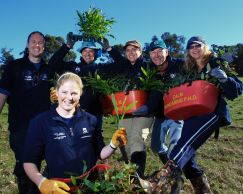New Study Says Volunteers are More Likely to Land a Job
Thursday, July 25th, 2013 Even though the economy is on the mend, it’s still a tough job market out there. But a recent report contains news that might make your volunteers feel better about their prospects—and help you recruit more talented volunteers, too.
Even though the economy is on the mend, it’s still a tough job market out there. But a recent report contains news that might make your volunteers feel better about their prospects—and help you recruit more talented volunteers, too.
The report was published by the Corporation for National and Community Service (CNCS), and it provides evidence of an association between volunteering and employment. In fact, it states that unemployed individuals who volunteer over the next year have a 27% higher chance of being employed at the end of the year than non-volunteers.
Interestingly, factors such as age, gender, geographical location, ethnicity and job market conditions did not change the odds.
The CNCS used over 10 years of data from the U.S. Census Bureau, and analyzed more than 70,000 people aged 16 and over. Their volunteering and employment records were studied over two years. The 27% increase in employment odds was stable over each year of the study, despite varying employment rates.
The research suggests that volunteering may provide a job-hunting advantage, regardless of the hiring conditions at the time.
Individuals without a high school diploma and those who live in rural areas saw even higher increases in the odds of landing jobs (51% and 55%, respectively). This suggests that those with limited skills or networking opportunities gain even more advantage when they volunteer.
Volunteering has long been seen as a way to enhance social connections, professional contacts, skills and experience. It can also be a route into a paying position with the nonprofit organization. Even the Department of Labor issued guidelines last year that volunteering can help unemployed people enhance their resumes and develop new skills. The agency encouraged state workforce offices to promote volunteering by those receiving unemployment benefits.
If you’re looking for quality volunteers, encourage those who are unemployed to apply with your organization. You may both benefit!









